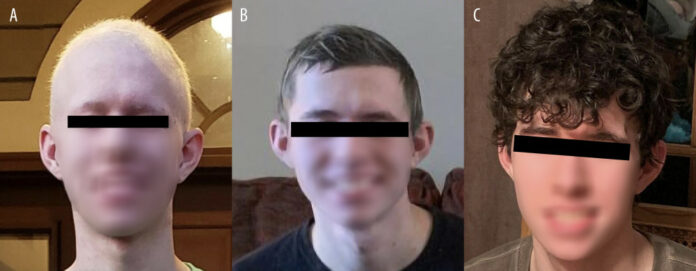
- This study outlines the case of a 16 year old white male who presented to a dermatology clinic with complete loss of scalp, eyebrow
- and eyelash hair.
- The patient was diagnosed with an autoimmune disease called alopecia areata
- He was prescribed a treatment regimen that included a monoclonal antibody that blocked the autoimmune reaction responsible for his disease
- This was the first time the drug has been used as a long term treatment for alopecia areata
Medical History
8 months before the patient experienced the complete hair loss, he visited his primary physician. At the time, the primary complain was regarding a 5 cm bald patch on his scalp. The primary care physician gave a diagnosis of tinea capitis, a fungal disease that causes a ringworm rash. The usual symptoms of this infection include itchiness, scaly skin and hair loss, He prescribed topical terbinafine as a treatment. However, the lesion continued to grow, and other hairless patches appeared on his scalp.
By the time the patient visited the authors of the case report, his scalp, eyebrow, and eyelash hair had been completely lost. The authors did not need to use any dermatoscopic techniques to confirm their diagnosis of acute alopecia totalis. “The disease process was evident from the patient’s presenting symptoms”, they explained.
The patient also had a medical history of atopic dermatitis since childhood, which was also inadequately treated using topical corticosteroids. This was apparent due to the erythematous eczematous patches the doctors found on his arms and trunk during a clinical examination. Furthermore, the patient was also allergic to eggs (type 1) and was asthmatic, under treatment with montelukast. There was no family history of alopecia areata or atopy.
Alopecia Areata
Alopecia Areata is an autoimmune disorder that causes patchy hair loss around the body. This is a result of the immune system attacking hair follicles. The patient in this case report was diagnosed with alopecia totalis, which is the complete loss of hair on the scalp. While many treatments for alopecia areata exist (including topical and intralesional corticosteroids, immunotherapies, topical minoxidil, and systematic immunosuppressants like cyclosporine and JAK/STAT inhibitors), their results are not concrete, and usually, the hair loss recurs after the treatment is stopped.
The Treatment for Alopecia Areata
Due to the variable nature of the traditional treatments, the authors instead prescribed a monoclonal antibody called dupilumab.
According to literature, the antibody has previously been used to treat alopecia areata with a high success rate. Therefore, the authors hoped that the antibody would have a good impact on this patient, while also treating his atopic dermatitis. Although their treatment of choice was not new, they explained, that the length of the treatment i.e. 3 years, made the case report “unique”.
The patient started treatment through a loading dose of 600 mg dupilumab. He then followed up with 300 mg injections in 2 week intervals, which continued for 3 years. He was also prescribed a concomitant regimen of topical corticosteroids.
In only 8 months, most of the patient’s hair regrew. Furthermore, his atopic dermatitis also improved. His atopic Body Surface Area reduced from 25% to 1% and his IGA of 3 improved to 1 in 6 months.
The patient continued the regimen for 3 years. During this time, the alopecia did not return.
How does Dupilumab work?
Autoimmune diseases such as alopecia areata are mediated by T helper cytokine signaling. Classically, science understood these to be Th1 and Th17 pathways. However, recent studies show that the Th2 may be a key overlooked pathway. These pathways may also be linked to each other, as Th2 inhibitors have been seen to interrupt Th1/Th17 pathways as well.
Therefore, dupilumab, a Th2 inhibitor, was chosen as the drug of choice for this patient’s alopecia areata. It inhibits the Th2 pathway by blocking IL-4 and IL-13 receptor alpha subunit.
While the drug is not yet FDA approved for treating alopecia areata, it does have approval for moderate to severe forms of atopic dermatitis, some forms of asthma (including eosinophilic or oral steroid dependent asthma), and chronic rhinosinusitis. Furthermore, scientists have performed long term studies to demonstrate the drug’s efficacy in treating atopic dermatitis and asthma. However, the authors of this case report did not find such long term data for the drug’s efficacy in treating alopecia areata.
A paradox
While the current case report, along with other short term studies, shows dupilumab’s relative prowess in inhibiting the Th2 pathway and improving autoimmune disease outcomes, this doesn’t always seem to be the case. The authors explain that some studies are reporting cases of dupilumab inducing alopecia areata in patients.
Furthermore, the authors note that the case report discusses a patient who had both alopecia areata and atopic dermatitis. Therefore his response to dupilumab should be studied accordingly, as patients with different immunological conditions may respond differently to the same drug.
Reference:
Kulkarni, M., Rohan, C. A., Travers, J. B., & Serrao, R. (2022). Long-Term Efficacy of Dupilumab in Alopecia Areata. The American journal of case reports, 23, e936488. https://doi.org/10.12659/AJCR.936488



